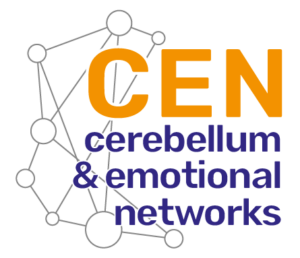European Virtual Institute to study the neural basis of emotion
A Marie Skłodowska-Curie Innovative Training Network funded by the European Research Council has been funded to explore the brain circuits that underlie emotional behavior. The award for over 4.5 million euros creates a Virtual Institute of 7 European universities and 7 industry/charity partners. The funds* will support 15 PhD students working across the consortium over the next 4 years.
The training network focuses on the role of a previously overlooked part of the brain, the cerebellum, and its involvement in the control of emotions. The cerebellum (Latin for “little brain”), contains more nerve cells than all other brain regions put together. It developed very early in the course of evolution and takes on important control functions in humans and animals, such as controlling fine limb movements. Damage to the cerebellum leads to serious clinical symptoms in humans, which in addition to movement disorders can also include cognitive and emotional impairments.
The new consortium, called CEN (Cerebellum & Emotional Networks), brings together researchers from across Europe and will address the contribution of the cerebellum in the control of emotions, and in particular fear and anxiety. Emotional disorders such as phobias, generalised anxiety and post-traumatic stress disorder (PTSD) are amongst the most prevalent psychiatric conditions. But our understanding of how disturbances in neural networks in the brain result in such disorders is limited, and many patients do not respond well to existing treatments. Key to unlocking new treatments and therapies for emotional disorders is to gain a comprehensive understanding of the nature and function of the neural networks that underpin such behaviours in both health and disease. A central aim of CEN is to share and combine knowledge in the field of cerebellar research and in the field of anxiety disorders. The knowledge gained will inform the development of new therapeutic strategies for individuals suffering from emotional disorders. For this purpose, two or three PhD students will work on specific aspects of the scientific question at each location. About half of the projects deal with fundamental studies in rodent models, which will enable a detailed description of the brain network processes at the level of individual and selected groups of nerve cells. The other half of the projects will look at cerebellar functions in humans, in healthy volunteers and in patients with diseases of the cerebellum and those with emotional problems such as anxiety disorders. An important feature of CEN will be creating a bridge between fundamental and clinical research, with results compared and linked in a variety of ways to provide fresh insights, including through the development of mathematical models that draw on animal and human results.In addition to discovery science, the focus of CEN will be on training a new generation of scientists with expert knowledge in both basic and clinical research. This will be achieved through intensive exchange via digital media and virtual research environments, as well as in joint conferences and laboratory internships. In addition, PhD students will get first-hand experience of private companies, NGOs, rehabilitation clinics and national and international patient self-help groups to broaden their horizons and provide them with an unrivalled opportunity to link academic research with commercial and not-for-profit organizations.The interdisciplinary and international training and research structure that CEN creates will provide exciting academic and non-academic career opportunities for young scientists. At the same time, the research discoveries gained will inform the development of new treatments for emotional disorders.
Participating universities:
University of Bristol, United Kingdom (Richard Apps, network coordinator and Charlotte Lawrenson)
University Hospital Essen, Germany (Dagmar Timmann, deputy network coordinator) École Normale Supérieure Paris, France (Daniela Popa and Clement Lena)
University Hospital Würzburg, Germany (Philip Tovote)
University of Edinburgh, United Kingdom (Peter Kind, Thomas Watson and Sally Till)
Università Pavia, Italy (Egidio D’Angelo and Lisa Mapelli)
Universitet Uppsala, Sweden (Tomas Furmark)
CEN website: https://www.cen-itn.net/

